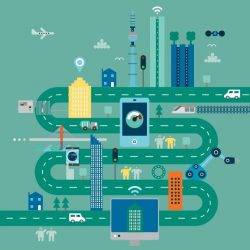August 12, 2018
Gig economy workers are overworked, underpaid and constantly monitored
 A study of the wellbeing of workers in the so-called gig economy from academics at Oxford University claims that they are stressed, isolated, micro-managed by algorithms and face constant downward pressure on their incomes. The focus of the research was on workers contracted by digital platforms and subject to selection by algorithms. The study, Good Gig, Bad Big: Autonomy and Algorithmic Control in the Global Gig Economy, looked at the impact on the personal wellbeing of computer programmers, translators, researchers and people in similar roles contracted through online freelance platforms.
A study of the wellbeing of workers in the so-called gig economy from academics at Oxford University claims that they are stressed, isolated, micro-managed by algorithms and face constant downward pressure on their incomes. The focus of the research was on workers contracted by digital platforms and subject to selection by algorithms. The study, Good Gig, Bad Big: Autonomy and Algorithmic Control in the Global Gig Economy, looked at the impact on the personal wellbeing of computer programmers, translators, researchers and people in similar roles contracted through online freelance platforms.








 As fresh graduates from generation Z, i.e. those born between the mid 1990’s and 2000 are enter the workplace, new research from Perkbox claims that over 1 in 3 (36 percent) admit that the workplace perks are one of the most important deciding factors on whether to accept a new job or not. These post-millennials are also the group most likely (32 percent) to prefer smaller benefits that they can enjoy on a more frequent basis, all-year-round, over one annual event, such as a Christmas party. The top three workplace perks most popular amongst Generation Z included simple benefits, such as receiving a day’s annual leave on your birthday (86 percent), followed by free coffee and hot drinks (85 percent), and flexi-hours (83 percent). Despite this, Generation Z feel less deserving of workplace benefits than co-workers born pre-1995, with fewer than half (38 percent) believing they should benefit from such offerings – which is less than any other age group.
As fresh graduates from generation Z, i.e. those born between the mid 1990’s and 2000 are enter the workplace, new research from Perkbox claims that over 1 in 3 (36 percent) admit that the workplace perks are one of the most important deciding factors on whether to accept a new job or not. These post-millennials are also the group most likely (32 percent) to prefer smaller benefits that they can enjoy on a more frequent basis, all-year-round, over one annual event, such as a Christmas party. The top three workplace perks most popular amongst Generation Z included simple benefits, such as receiving a day’s annual leave on your birthday (86 percent), followed by free coffee and hot drinks (85 percent), and flexi-hours (83 percent). Despite this, Generation Z feel less deserving of workplace benefits than co-workers born pre-1995, with fewer than half (38 percent) believing they should benefit from such offerings – which is less than any other age group.


 New research has revealed the top 15 cities worldwide that are best for remote working and Prague is on top, with London ranked as the 5th best city in the world for remote workers. Inspired by the top 15 cities listed in InterNation’s Expat City Ranking Report, Powwownow analysed the cost of living, average monthly salary, internet speed, price of coffee, and cost of public transport in different places across the world. Cities were individually scored on each factor and ranked by the total number of points, to calculate the top 15 cities around the world. Calculating an overall ranking for each city, Prague was revealed to be the best city worldwide for remote workers.
New research has revealed the top 15 cities worldwide that are best for remote working and Prague is on top, with London ranked as the 5th best city in the world for remote workers. Inspired by the top 15 cities listed in InterNation’s Expat City Ranking Report, Powwownow analysed the cost of living, average monthly salary, internet speed, price of coffee, and cost of public transport in different places across the world. Cities were individually scored on each factor and ranked by the total number of points, to calculate the top 15 cities around the world. Calculating an overall ranking for each city, Prague was revealed to be the best city worldwide for remote workers. 


 Employers need to recognise the workplace as integral to delivering a business’ commercial strategy, and treat employees as ‘workplace consumers’ – creating ‘frictionless’ experiences and environments that help them perform to their best ability. This is according to a report: ‘Optimising performance: defining, designing, maintaining and evolving workplace experiences’ from Interserve, undertaken in partnership with Advanced Workplace Associates (AWA). The two-year study into the science behind effective working environments argues there is a need to radically re-envisage workplaces to optimise team productivity and maximise the value of physical working environments. It sets out a series of critical steps for knowledge-based businesses to revolutionise the workplace – and thereby aid employee performance. The report argues that traditional silos, from IT and HR to facilities, need to be broken down to integrate the management of the workplace as part of a ‘one-team’ approach; doing so will ensure companies can deliver a streamlined workplace experience which supports employee productivity.
Employers need to recognise the workplace as integral to delivering a business’ commercial strategy, and treat employees as ‘workplace consumers’ – creating ‘frictionless’ experiences and environments that help them perform to their best ability. This is according to a report: ‘Optimising performance: defining, designing, maintaining and evolving workplace experiences’ from Interserve, undertaken in partnership with Advanced Workplace Associates (AWA). The two-year study into the science behind effective working environments argues there is a need to radically re-envisage workplaces to optimise team productivity and maximise the value of physical working environments. It sets out a series of critical steps for knowledge-based businesses to revolutionise the workplace – and thereby aid employee performance. The report argues that traditional silos, from IT and HR to facilities, need to be broken down to integrate the management of the workplace as part of a ‘one-team’ approach; doing so will ensure companies can deliver a streamlined workplace experience which supports employee productivity.




























August 9, 2018
Is driver behind the widening parental leave gap a lack of rights in the gig economy?
by Sara Bean • Comment, Flexible working, Legal news, News, Workplace